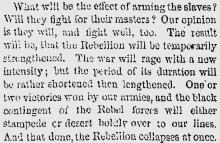Arming the Slaves.
The Rebel leaders are conscious that in adopting the policy of arming the Slaves, they are embarking in a perilous enterprise. They approach the subject with fear and trembling. They know they are taking a step which m ay result not only in the ruin of their cause but in the destruction of society itself. They are well aware that the arms they propose to put into the hands of the servile masses may be turned against their own breasts, and the power they delegate may be a power that will be used to crush them. They are not without misgivings that the education in arms they intend to confer upon the Blacks will be "improved" not only to achieve their own Freedom, but to expel the white race as well.
Hence they tread cautiously. JEFF. DAVIS, it will be remembered, when he originally broached the matter, proposed simply to use the negroes for specific camp duties. When the subject first came up in the Rebel Congress, it was attempted to limit the number of "laborers" who should be impressed to 30,000 in the States east of the Mississippi and 10,000 in the States west of that river. But the majority clearly saw that this was a half way measure and resolved to make the impressment of field hands for the Rebel service unlimited.
This last point was not carried without severe opposition. The debate was long and bitter. Mr. TURNER, of North Carolina, denounced the measure as another of JEFF. DAVIS' "dangerous schemes;" insisted that the Slaves would not fight on the side of the Rebellion, but would prove the best allies of the Union troops in overthrowing the Rebel armies. Another member proposed that the Slaves "shall not be used as soldiers." This proposition was warmly seconded by WM. PORCHER MILLS, of South Carolina, who insisted that the arming of the negroes would be a [illegible] to the institution of Slavery and would overturn the whole social fabric of the South. Others denounced the measure with equal emphasis and predicted as the result of its operation certain and utter ruin.
But these notes of warning are unheeded. The Rebels have no longer the power to choose. The negro is their "last card." They are determined to stake all upon it. Without it they are surely lost; by using it they think there may be a faint chance to win. The white element is virtually exhausted; there is no alternative except to try the black or surrender all. The step is not one of policy, but one of desperation. It is the drowning man catching at a straw––the condemned felon trying to dig his way out of his cell with his finger nails! He knows the chance of escape is remote; but he knows if he does not escape he is sure to be hung, and the knowledge makes him for the moment strong.
What will be the effect of arming the slaves? Will they fight for their masters? Our opinion is they will, and fight well, too. The result will be, that the Rebellion will be temporarily strengthened. The war will rage with a new intensity; but the period of its duration will be rather shortened than lengthened. One or two victories won by our armies, and the black contingent of the Rebel forces will either stampede or desert boldly over to our lines. And that done, the Rebellion collapses at once.
"Arming the Slaves," Albany (NY) Evening Journal, February 7, 1865, p. 2.

